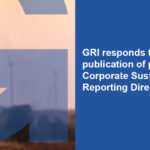Proposed guidelines for Operating and Financial Review reports require British company directors to discuss the effects of social and environmental issues on business.
Mandatory corporate reporting on social and environmental issues is stalled in limbo in the US, but it is proceeding forward in the UK. While the US Securities and Exchange (SEC) fails to enforce existing regulations, UK Secretary for Trade and Industry Patricia Hewitt released a consultative draft of regulations for Operating and Financial Review (OFR) reports earlier this month. The document calls for mandatory reporting on environmental and social issues beginning in fiscal year 2005 for all 1290 quoted companies in the UK, a requirement supported by socially responsible investment (SRI) advocates.
"Shareholders can exercise effective control only if they have clear and meaningful information about the main drivers of a company’s past and future performance," the document states. "The OFR is designed to arm shareholders with that information."
"Through a narrative report, it will enable them to make a proper assessment not only of past performance but also of the directors’ view on the company’s future prospects and its approach to managing all those factors–environmental performance, employee issues, relations with suppliers, customers and local communities–which are crucial to the company’s future success and reputation," the document continues.
While the proposed OFR guidelines stop short of requiring companies to act on social and environmental issues, they do require directors to explain why they are not acting on them.
"Interestingly, the government is proposing that companies should be required to state formally that they have considered specific issues, even if they conclude there is nothing significant enough to report on–in other words, the directors would have to say ‘We have considered environmental issues and concluded that we do not need to report on them,’" said Rob Lake, head of SRI engagement and corporate governance for Henderson Global Investors. Mr. Lake served on the OFR working group, the independent committee that drafted the guidelines.
However, disclosure often effects action on the matter at hand, as the admission of inaction could prove awkward if not incriminating.
The draft explicates its reasoning for mandating environmental and social issues.
"A poor record on environmental or health and safety matters, for example, could adversely affect a company’s standing and business prospects," the document states. "For regulated sectors, non-compliance could lead to the loss of license to operate, and in some cases, imprisonment for directors."
Issues that must be addressed include risk management for toxic substance use and impacts on biodiversity, and plans for mitigating climate risk and dealing with natural resource scarcity by companies that depend on them. The proliferation of such information encourages factoring it into investment decisions.
"The main benefit of the OFR is that it is properly focused on one specific, relevant, audience–the financial community," said Mallen Baker, development director for London-based corporate social responsibility (CSR) advocate Business in the Community (BITC). "Financial analysts are accustomed to taking data provided by the company in the form of reports, comparing it to what they know of the company, its leadership and industry sector, and then making a judgment."
"If the same judgment can be brought to the process of non-financial reporting, it will make a huge difference," Mr. Baker told SocialFunds.com.
OFR reports will not necessarily supplant existing non-financial reporting mechanisms, but rather will complement them.
"There will still be important audiences for separate sustainability or corporate responsibility reporting–including socially responsible investors and many other stakeholder groups that will expect both more detailed data on issues that are covered in the OFR, and information on other issues," Mr. Lake told SocialFunds.com.
At an average estimated cost of $51,000 (£29,000) per OFR report, companies may balk at the expense.
"There are rising concerns within business about the costs of compliance, and the OFR reports will need to show their value pretty quickly if they are to survive," said Mr. Baker. "Companies that use the process of reporting as a discipline that helps them to manage the business generally find it is well worth the investment."
"Companies that go through the motions just because the OFR tells them to will probably only see cost," Mr. Baker added.
The OFR document invites public comments through August 6, 2004.



